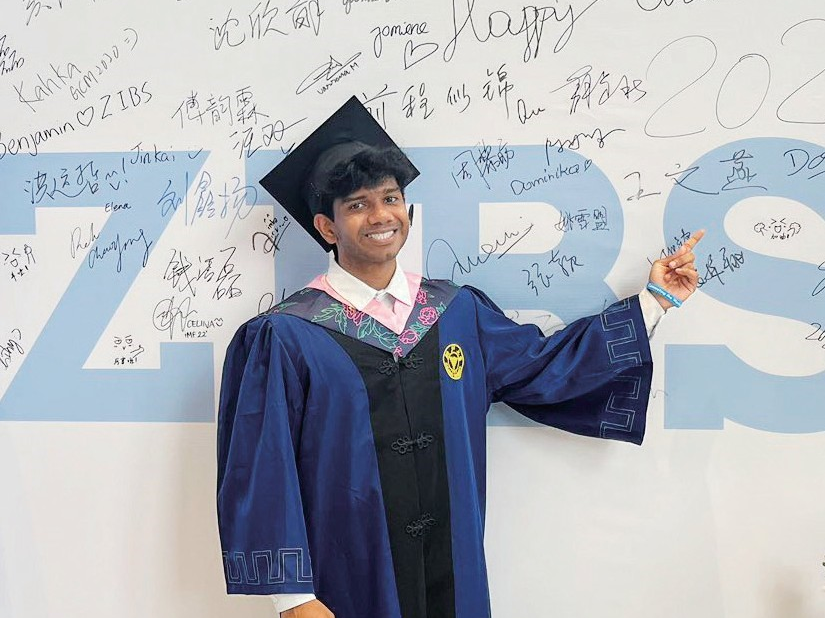Kaluharage Dasun De Silva, a graduate from the iMF program at ZIBS, comes from Sri Lanka. How did he overcome the challenges of language and cultural differences while studying in China? And how did he discover the possibilities on this land full of vitality? Let's step into his story to uncover his experiences and insights.
Kaluharage Dasun de Silva iMF graduate,Sri Lanka
To those of you that wonder if you should study in China, ask yourself, What is it that you want? To maintain your current level of comfort or reach for the stars?
Studying in a foreign country can be daunting. You find yourself in a completely new place with unfamiliar cuisine, culture, and language. For the most part, you'll be alone—at least in the beginning—until you make new friends. This journey can be especially intimidating if you choose to study in China.
If you're like me, you grew up immersed in Western culture. I studied my entire life in English and watched American and British movies and TV shows. I enjoy eating pizza and socializing with my friends on Instagram and Meta (formerly known as Facebook). In contrast, I knew very little about China; other than that, it was the fastest-growing economy in the world and was rapidly becoming a global superpower. However, driven by curiosity and a desire to follow an unconventional path, I decided to study in China. I was fortunate enough to be accepted into one of China's top universities, Zhejiang University (ZJU), to pursue the Master of Finance (iMF) program at ZIBS. The campus for my program was located in Haining, a small city in Zhejiang Province. What appealed to me about its location was its proximity to both Hangzhou and Shanghai, two of China's most important metropolitan cities. For those who may not fully grasp the significance of this opportunity, here's a bold statement: Shanghai is like New York City but bigger and better.
Although there were lots of challenges in coming to China—especially due to the language barrier—once you figure out ways to overcome them, your quality of life improves drastically. For example, I haven't taken my wallet out of my dorm since the day I arrived in China. I'm able to navigate, pay, and communicate via just three apps: WeChat, Alipay, and Amap. I can buy almost anything I want on Taobao or Pinduoduo for cheap, and it arrives within three days. I can use Meituan to easily order food and call a taxi at any time of the day on Didi. Life in China is affordable, convenient, and comfortable if you make the effort to learn a few tricks.
Once you've mastered the essential apps, survival will no longer be an issue. But is mere survival really enough? Humans are social primates; it's in our nature to socialize and build emotional connections with others. However, it can be challenging to build these relationships due to the language barrier and, more importantly, cultural differences. I struggled to develop meaningful connections during my first two months, but it was bearable since I never felt isolated—Chinese people are friendly and curious. Although many of them are shy, whenever I initiated a conversation, they always reacted positively, excited and impressed by my limited use of Chinese phrases.


Additionally, ZIBS went above and beyond with cultural events like Africa Month or Latin America Month, planning various activities to share and educate students about these cultures. All these activities played a significant role in making my life enjoyable and educational during my stay. I have developed a deep appreciation and respect for China and many other regions of the world because of it. When I met other foreigners at the university, coming from different countries around the world, we formed a diverse group with significant differences, but we all empathized with each other's experiences of moving to China. Our shared experiences became the foundation of our friendships. With them, the bad memories didn’t seem so bad anymore—they became just part of the experience, something we could look back on and laugh at together. Over time, these friends became some of the closest people to me, knowing me in ways that even my own family does not.
Studying at ZJU was an exciting journey. There was a strong emphasis on going beyond the classroom. ZIBS held a remarkable number of events to enrich the study experience. On an academic level, we were constantly visited by prestigious individuals who shared their wisdom at seminars and lectures. Furthermore, many field trips were organized to companies like Ant Group's headquarters or cultural sites such as West Lake in Hangzhou, ensuring we had a broad understanding of the context of what and where we were studying.
In the second year of my study at ZIBS, I got the chance to conduct a six-month internship at an leading electronic vehicle company in Hangzhou. During my internship, I had the unique opportunity to embark on a solo business trip to Jaipur, India, to meet with a supplier. This experience was a tremendous learning curve, from booking tickets and planning the trip to conducting meetings, asking critical questions, and evaluating product quality. Typically, such significant responsibilities aren't entrusted to interns, but this company is different. They recognize the strengths and weaknesses of their employees, providing opportunities for growth and development. Each day brings new challenges and learning opportunities, reinforcing the importance of teamwork, adaptability, and effective communication. As I navigate through this dynamic environment, I am constantly inspired by the collective drive and ambition of my colleagues, making this internship an invaluable stepping stone in my career journey.
Although I am one of the very few foreigners working at this office in the heart of Hangzhou, I never feel excluded. The working culture here is remarkably international, and many employees I have spoken to are open-minded, sharing similar interests in movies and sports. On weekends, I sometimes meet up with coworkers from different departments to play badminton or basketball, further strengthening our bonds beyond the office walls.
To those of you that wonder if you should study in China, I say yes and no. No because it will not be easy; things will not be handed to you on a silver plate. It takes grit and conviction to learn how to thrive here. Yes, because China is an incredible place like no other, some places are straight out of a sci-fi novel. There is more opportunity here than anywhere else in the world based on my experience if you're willing to turn over every stone. The challenges faced here force you to adapt and evolve. Undoubtably, I am a better person because of what I had to overcome. So ask yourself, What is it that you want? To maintain your current level of comfort or reach for the stars?
(The article originally published in the Study Abroad magazine, Issue 19, 2024)





